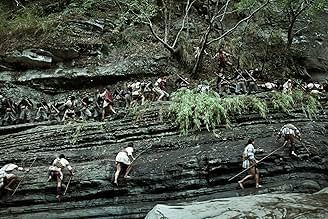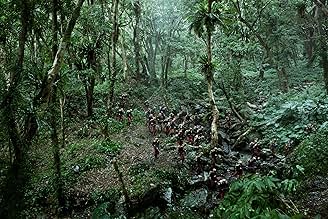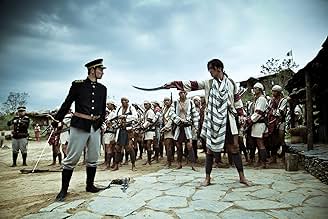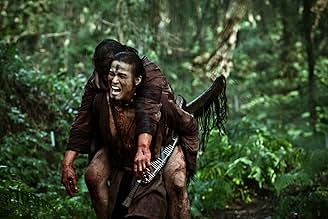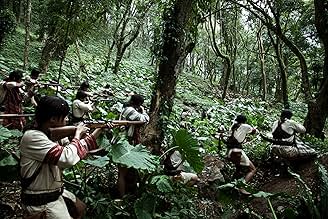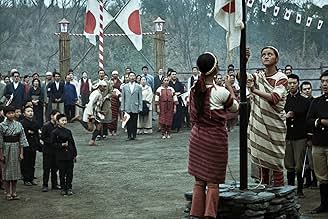IMDb-BEWERTUNG
7,5/10
7498
IHRE BEWERTUNG
Bildgewaltige Aufarbeitung einer wenig bekannten Episode aus der jüngeren Geschichte Taiwans.Bildgewaltige Aufarbeitung einer wenig bekannten Episode aus der jüngeren Geschichte Taiwans.Bildgewaltige Aufarbeitung einer wenig bekannten Episode aus der jüngeren Geschichte Taiwans.
- Auszeichnungen
- 15 Gewinne & 29 Nominierungen insgesamt
Nolay Piho
- Mona Rudao
- (as Lin Ching-tai)
Pawan Neyung
- Baso Mona (Mona's Younger Son)
- (as Lee Shih-chia)
Yi-Fan Hsu
- Ichiro Hanaoka aka Dakis Nomin
- (as Bokeh Kosang)
Empfohlene Bewertungen
Wei Te-Sheng had this movie planned way before his hit movie "Cape No.7" which was a big hit. And his efforts really shows in this movie, it's basically a high budget epic from taiwan that is most definitely worth watching. On the exterior it might seem like another historical movie about Japanese occupation and invasion and how they mistreated, enslaved and also raped the people on the land they invaded. While also taking away their tradition, culture, language and freedom. Thus making the people rise up and throw a rebellion and fight the Japanese for justice, pride and freedom. But this movie has a lot of interior elements as well. It really does a good job of now going down a narrow rebellion movie but brings out the scars, the harshness and manly pride. Some scenes are uncomfortable to see but it shows the brutality and the length the rebels are willing to go. The movie takes place in taiwan during the 1895 and 1945 on a land where two tribes use to fight each other. but what happens when a more menacing enemy comes to enslave all of them? This movie is simply very well crafted with good pacing and editing. Wei Te-Sheng seems like a talented director and I am grateful that his vision his got from a comic book came to life on the big screen. This feels kind of like a taiwanese version of the movie "300" except with more substance and emotion with scars going for it. Highly recommended to anyone that enjoys historical movies with some realistic guerrilla battle tactics.
8.2/10
8.2/10
then try to watch this 'Warriors of The Rainbow', and tell me if you could spot the similarities of these two movies. The invasion of the British soldiers to north America vs the Japanese soldiers invaded Taiwan; then there's a great fighter among the Mohicans warriors on par with a ferocious fighter among the Taiwanese aboriginal tribes; then again, the Mohicans got feudal sworn enemy of another tribe to the similar feud of two Taiwanese aboriginal tribes....Then when i watched this movie, i suddenly realized that the whole picture is more like when the American forces invaded Iraq, there were tribes to become the collaborators helping Americans and using them to help killed their own feudal enemies... But this is the first time that I felt this movie was a very mature production since I never found anything like it out of Taiwan. Because usually, all movies from Taiwan, the dialogs were disgustingly embarrassing feminine, males whining like females. Yet this movie is absolutely masculine and this is first time that I felt the male population in Taiwan sounded and acted more like man, not just whiners. Furthermore, this is also the first time that I consider this movie is at a higher international level with great acting, directing and cinematographic achievement. And this is very rare to me and totally win my respect back to the Taiwanese movie industry. Salute!
10magchau
I agree too. I did some wiki research when I first learn about this film and it is really helpful to get a fuller sense of the theme given a basic historical context. Disclaimer: I have seen the first part only (the second part is in theaters today in HK).
Similar to previous comment, this movie reminds me of the situation in Tibet right now. How the "Han-ization" is happening when the culture and religion in Tibet is slowing disappearing. What would I do if I were one of the young men in the tribes in the movie?
And is this that much different to the change happening to our very own culture (both Eastern and Western) in the face of globalization and extreme consumerism? This is how much the film has provoked me into contemplating.
Also with all the head chopping and fighting scenes the director has successfully illustrates the values and beliefs of life of the tribes without a taint of violence. Yes it's bloody but not violent. Wonder how that is possible right? (This is refreshing in the midst of our media culture on big screens and on TV).
I would not use the word entertaining for this movie but nonetheless it is not as serious/"boring" as the topic and plot might sound. And 144 minutes just flew by without my notice and my 60+ years old parents were actually hoping to watch the second half right after the first.
Definitely a not-to-miss for this year!
Similar to previous comment, this movie reminds me of the situation in Tibet right now. How the "Han-ization" is happening when the culture and religion in Tibet is slowing disappearing. What would I do if I were one of the young men in the tribes in the movie?
And is this that much different to the change happening to our very own culture (both Eastern and Western) in the face of globalization and extreme consumerism? This is how much the film has provoked me into contemplating.
Also with all the head chopping and fighting scenes the director has successfully illustrates the values and beliefs of life of the tribes without a taint of violence. Yes it's bloody but not violent. Wonder how that is possible right? (This is refreshing in the midst of our media culture on big screens and on TV).
I would not use the word entertaining for this movie but nonetheless it is not as serious/"boring" as the topic and plot might sound. And 144 minutes just flew by without my notice and my 60+ years old parents were actually hoping to watch the second half right after the first.
Definitely a not-to-miss for this year!
First of all it is better to watch the film in full 4.5 hr instead of watching as 2 parts, which is what I did in film fest.
Secondly, you have to know a little of history and tradition of Taiwan and roles of aboriginals to truly have a feeling for the movie. Just Wiki "Wushe Incident", and "Taiwanese Aboriginal" and that makes things much better as you watch.
Anyway back to the film, the selling point seems to be all the killing, the action, the big budget. However after watching it I've found out it's more about the value of "death" that the film tries to bring to us, and death weights in front of abstract values such as "tradition", "dignity", etc.
It's really an entertaining film for sure and throughout the 4.5 hrs time just flies, and you have to adjust yourself to have that desire to discover more about aboriginals believes and ways of living, much like watching documentary films mentality.
I can't stop comparing this "Civilization vs. Barbarian" plot to what is happening in middle east right now. In such sense history is repeating, and the film is definitely pointing out how pointless the loss of lives is (depends on which stand you are taking though).
Overall this is one of the best and most enjoyable films in recent years. The director is trying to lead us to think critically towards topics on death, values, tradition and how these would change when worlds collide.
Secondly, you have to know a little of history and tradition of Taiwan and roles of aboriginals to truly have a feeling for the movie. Just Wiki "Wushe Incident", and "Taiwanese Aboriginal" and that makes things much better as you watch.
Anyway back to the film, the selling point seems to be all the killing, the action, the big budget. However after watching it I've found out it's more about the value of "death" that the film tries to bring to us, and death weights in front of abstract values such as "tradition", "dignity", etc.
It's really an entertaining film for sure and throughout the 4.5 hrs time just flies, and you have to adjust yourself to have that desire to discover more about aboriginals believes and ways of living, much like watching documentary films mentality.
I can't stop comparing this "Civilization vs. Barbarian" plot to what is happening in middle east right now. In such sense history is repeating, and the film is definitely pointing out how pointless the loss of lives is (depends on which stand you are taking though).
Overall this is one of the best and most enjoyable films in recent years. The director is trying to lead us to think critically towards topics on death, values, tradition and how these would change when worlds collide.
I walked out of the cinema with both surprise and worry. I'm worried because maybe this is not a very good film, especially not a good "commercial film" to make both ends meet, but I'm really glad to see that Te-Sheng Wei can still insist on his idea even in such a big production.
Before going to the theater, my first concern was whether it would become a stereotypical nationalism or humanism film, because The Wushe Incident had been represented so many times in our history class in Taiwan that it seemed to be too difficult to make this film without compromising on political correctness, but Te-Sheng Wei made it!
Sàidékè balái presented a mass of killing and death, not in a humanism or Han Chinese Nationalism way, but from the aspect of the Seediq. I have heard people arguing if it is necessary to have so much violence in this film, but I have to say that the value of peace or anti-war is the main stream nowadays but not so to the traditional Seediq that time. Therefore, I think the director is not a moral relativist, he just chose not to judge the past with today's value, and resisted the mainstream that drowned the voice of the minority.
It impressed me that there was little Chinese or Taiwanese through out this film. Instead, the film is composed of Seediq language and Japanese. We should cherish it that 80 years after the The Wushe Incident, we can finally see a film which represents historical event not based on the authority opinion but on people who didn't lead the history, i.e. the native.
Before going to the theater, my first concern was whether it would become a stereotypical nationalism or humanism film, because The Wushe Incident had been represented so many times in our history class in Taiwan that it seemed to be too difficult to make this film without compromising on political correctness, but Te-Sheng Wei made it!
Sàidékè balái presented a mass of killing and death, not in a humanism or Han Chinese Nationalism way, but from the aspect of the Seediq. I have heard people arguing if it is necessary to have so much violence in this film, but I have to say that the value of peace or anti-war is the main stream nowadays but not so to the traditional Seediq that time. Therefore, I think the director is not a moral relativist, he just chose not to judge the past with today's value, and resisted the mainstream that drowned the voice of the minority.
It impressed me that there was little Chinese or Taiwanese through out this film. Instead, the film is composed of Seediq language and Japanese. We should cherish it that 80 years after the The Wushe Incident, we can finally see a film which represents historical event not based on the authority opinion but on people who didn't lead the history, i.e. the native.
Wusstest du schon
- WissenswertesTaiwan's official submission to the Best Foreign Language Film category of the 84th Academy Awards 2012. To meet Academy regulations, the four-and-half-hour full version of the diptych was submitted as one entry.
- Zitate
Mona Rudao: There are more Japanese people than the tree leaves in the forest, than the pebbles in Jhuoshuei River. But my determination to fight them is more adamant than Mt. Chilai! If your civilization wants us to cringe, I'll show you the pride of savages!
- VerbindungenFollowed by Sai de ke · ba lai: Cai hong qiao (2011)
Top-Auswahl
Melde dich zum Bewerten an und greife auf die Watchlist für personalisierte Empfehlungen zu.
- How long is Warriors of the Rainbow: Seediq Bale I?Powered by Alexa
Details
- Erscheinungsdatum
- Herkunftsland
- Offizielle Standorte
- Sprachen
- Auch bekannt als
- Warriors of the Rainbow: Seediq Bale I
- Produktionsfirmen
- Weitere beteiligte Unternehmen bei IMDbPro anzeigen
Box Office
- Budget
- 23.000.000 $ (geschätzt)
- Bruttoertrag in den USA und Kanada
- 136.166 $
- Eröffnungswochenende in den USA und in Kanada
- 57.183 $
- 29. Apr. 2012
- Weltweiter Bruttoertrag
- 4.670.432 $
- Laufzeit
- 2 Std. 24 Min.(144 min)
- Farbe
- Seitenverhältnis
- 2.35 : 1
Zu dieser Seite beitragen
Bearbeitung vorschlagen oder fehlenden Inhalt hinzufügen


